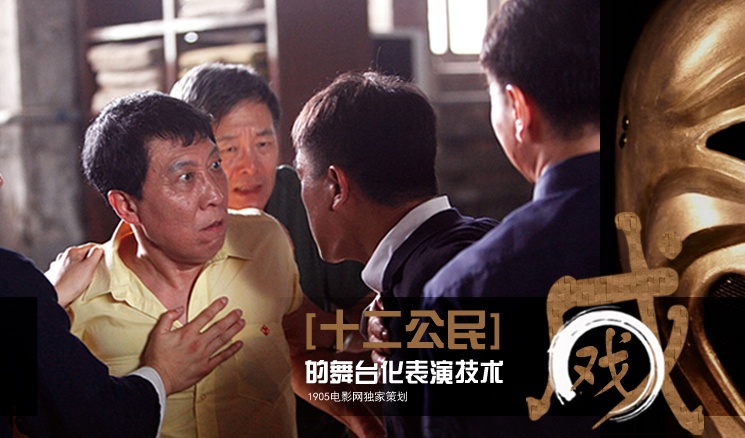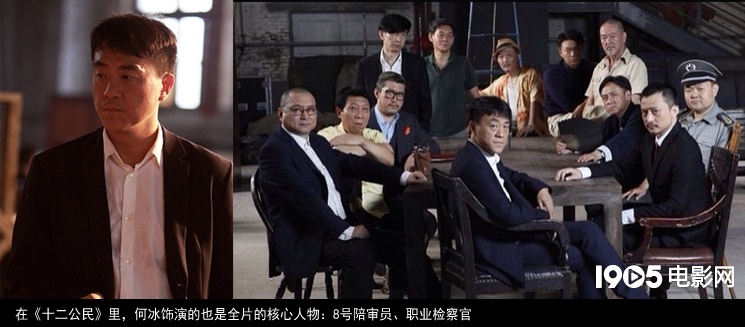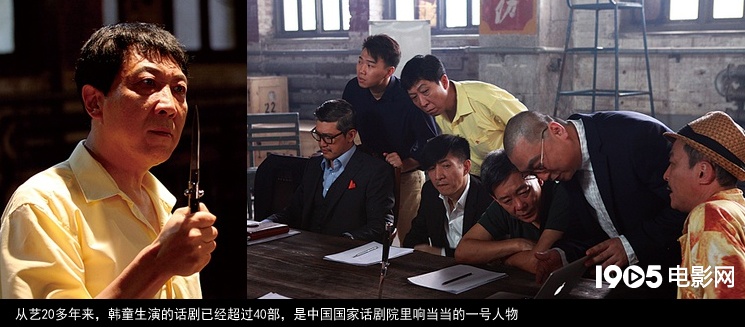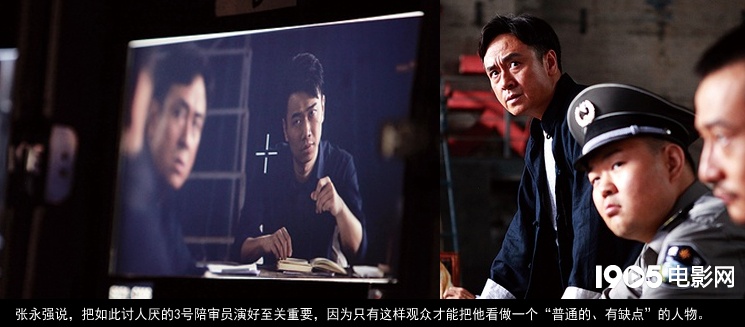No drama without skill: on the staged performance technology of Twelve Citizens

Special feature of 1905 film network It has been released for a full week, and the box office has accumulated less than 8 million — — Obviously, as another literary film cannon fodder after The Intruder and Missing, the fate of Twelve Citizens is not surprising at all. At this time, let’s discuss this film again. Let’s first put aside the survival dilemma of Chinese literary films under the pressure of superhero movies, and don’t look down on the film’s "12 Angry Men" with a tune, let alone go online because of a jury system that is still in an overhead narrative — — From the most direct point of view, the appearance of Twelve Citizens is a sharp and hot performance class, which shows us how China actors who can really act can complete this set of technical work.
Not long ago, at the premiere of Twelve Citizens, 37-year-old director Xu Ang wore an elegant blue suit, with high hair and well-matched glasses. Xu Ang is a drama director of Beijing People’s Arts. Occasionally, he will provoke a role in his own drama, and he knows everything about sound and form. Twelve actors standing with him, ten from Beijing People’s Art and two from China National Theatre. The fierce confrontation of long lines, the expressive language full of details, and the 16-day rehearsal before shooting … … Just as He Bing, the star of the film, said, Xu Ang’s greatest skill lies in his ability to show the top drama performance energy in China on the big screen.
The scene of "Twelve Citizens" is single, and the plot development depends entirely on the actor’s body and lines. However, if one actor misses, the whole plate may fall apart. Although this form of expression is borrowed from 12 Angry Men, it is still avant-garde in today’s cinema, and twelve professional drama actors such as He Bing, Han Tongsheng, Gao Dongping, Wang Gang and Zhang Yongqiang have accomplished this task without disgrace, which can not be accomplished by casually coming to an idol group.


He Bing is one of Xu Ang’s "underlings", and the performance of He Bing, the protagonist, played an important role in Xu Ang’s "Sorrow of Comedy", which set a new box office record for Beijing Renyi. In "Twelve Citizens", He Bing plays the core figure of the film: Juror No.8 and professional prosecutor. With his strong logical reasoning and emotional telling, he broke the voting result from 1:11 to 12:0 step by step.
He Bing said, "Twelve Citizens" is very comfortable to play because he believes in the charm of language. "What I used in the play was the Beijing dialect that I have been speaking for so many years. I found that Chinese’s speech has become more and more chaotic. Before I saw some young hosts, I thought they were from Hong Kong and Taiwan. As a result, I really went to Taiwan Province and found that people there didn’t speak like that at all, which means that many people created a dialect by themselves. This is terrible." In his view, the literariness of Twelve Citizens is mainly reflected in the lines, and the fate behind the characters is also expressed by the lines. If an actor wants to play a good play, he must first learn to "speak people’s words".
"People often ask me how to control my performance when I am playing drama, movies and TV series. In fact, I think it is unnecessary to worry too much about environmental changes sometimes." He Bing said that over the years, he has always adhered to the spirit of stage performance: "Whether you are facing the camera or the audience behind the’ fourth wall’, your fist must be clenched. Abstract or plain, the actor’s strength can’t be scattered, as long as you can hit the audience’s heart. "
In He Bing’s view, the really interesting performance is the victory of personality, not the victory of technology. "Qian Bo, the No.7 juror, may be the least proficient in performance at present, but I believe he is very good to cut out, because he is playing hard, and he knows that his craft is rusty, which is equivalent to a boxer knowing that he is not a professional, so he will strip off his clothes and rush directly. I play drama all the year round. How can he compare with me in his glib mouth? But this is not important. What is important is that he rushes up with this heart, then this is helpless, so it is good to cut it out. "


When Han Tongsheng is mentioned now, many people will say that he is the "national father-in-law" in domestic TV series, but Han Tongsheng’s ability can be more than that. Over the past 20 years, Han Tongsheng has performed more than 40 plays, and won two heavyweight awards in China’s drama industry, the Plum Blossom Award and the Golden Lion Award. He is a well-known figure in China’s National Theatre. "Twelve Citizens" is a group play, but the No.3 juror played by Han Tongsheng is undoubtedly the most dramatic and brilliant. He uses his accumulated performance experience for many years to interpret an angry and stubborn Beijing taxi driver in a very three-dimensional way, with a lot of tricks and small eyes.
According to Han Tongsheng’s performance theory, small gestures are very helpful for shaping characters. "He usually sits in the driver’s seat, even if it is only for a few minutes, he has to wear a seat belt, concentrate and be very bound. So once he leaves the car, he will find all kinds of postures that make him comfortable. I will seize this point. I rarely sit in one position for a long time during shooting, either leaning on a chair with one leg or crouching, or crossing my legs, thus making myself more free and unconstrained. "
Han Tongsheng said that creating roles is an art as well as a craft, but the basic skills of actors have been forgotten after a long time. "If you don’t teach these, the performance departments of the Theatre Academy and the Film Academy are all teaching for four years. What should they teach? If we don’t talk about this, we can just drag a person to perform in the street. Do we need a special performance major? Today, I really should appeal to young actors to remember how they took acting classes at the beginning and must make up this class. "
"Actors like Mr. Han don’t get the attention they deserve in China. If the craft of realistic performance is not protected, this stunt will be lost in China." This is Xu Ang’s evaluation of Han Tongsheng, and it is also a portrayal of today’s "film talent market".


Many years ago, there was a TV series called "I Love My Family", where Zhang Yongqiang played an unreliable young man named Meng Chaoyang. Xu Ang said that he especially liked the role because he was ridiculous and had many shortcomings. "The view of that era was that people’s shortcomings were wonderful. When the current drama comes to people’s shortcomings, it is a bit ugly. "
Juror No.10, played by Zhang Yongqiang in Twelve Citizens, is a person who is full of shortcomings and has not been vilified. His prejudice against outsiders actually comes from his own experience; His egotism in speech also comes from his living environment and background: a native of Beijing who lives by collecting rent, has no knowledge or expertise, but is full of arrogance and prejudice. Zhang Yongqiang thinks this is true: "I am a Beijinger, and I have observed all kinds of Beijingers in my life. One of them has blind lofty and self-confidence, and thinks that’ the son of heaven is my boss’."
"When I first saw the script, I really thought this person was quite annoying." Zhang Yongqiang said that an actor’s duty is to embrace everyone with his heart, so as to play an ordinary person with shortcomings. "You have to love him from the heart, and try to figure him out with your heart, find the really lovely part of his character, and then carry it forward." Zhang Yongqiang said that it is very important to play such an annoying juror No.3 well, because only in this way can the audience regard him as an "ordinary and flawed" character. Although No.3 has some shortcomings, at least his anger and apology are sincere. This is the homework that an actor needs to do well before taking over a character.

Historically speaking, drama performance art was born before film and television performance art, and academically, it is generally believed that drama performance is the basis of film and television performance. As we know, the performance students of Beijing Film Academy often begin to learn and train from stage performance. This is mainly because drama is the art of the stage, while film is the art of the lens. Drama actors have the responsibility to guide the audience, and they can’t rely on the movement of the lens, which puts more extreme demands on the actors’ body and language expression. With these polishing on the stage, and with your own life experience to tap the reasonable words and deeds of the characters, the actor’s performance will naturally be wonderful and moving, and it is worth your standing ovation.
If it is really implemented at the technical level, the control of expressions, movements and lines by drama actors is often more concentrated and clear. In this era of looking at the face and looking at the meat, many actors caught on the big screen simply don’t know anything about these technical activities, and the crude and false performances are too easy to make people feel awkward. That’s why, aside from the discussion on the connotation of the text, Twelve Citizens will become a very cool movie to watch.
It is true that drama performance and film and television performance must be different because of different carriers. Too staged performance methods are sometimes not suitable for the daily expression needs of movies, and too much emphasis on skills is easy to become a craftsman. But the problem is, a person who has not yet established his stance is crooked no matter how much he releases his feelings. Nowadays, China movies have been dragged along by quick money, and people are often more willing to see a glamorous result, but they ignore the process that real masters have honed for many years. In fact, there are so many good actors who can act, but unfortunately, fewer and fewer people are willing to pay attention and give applause.